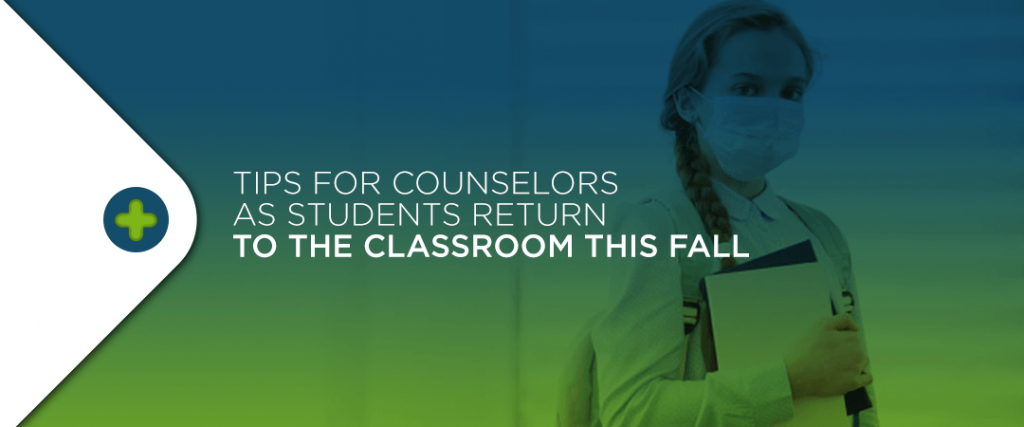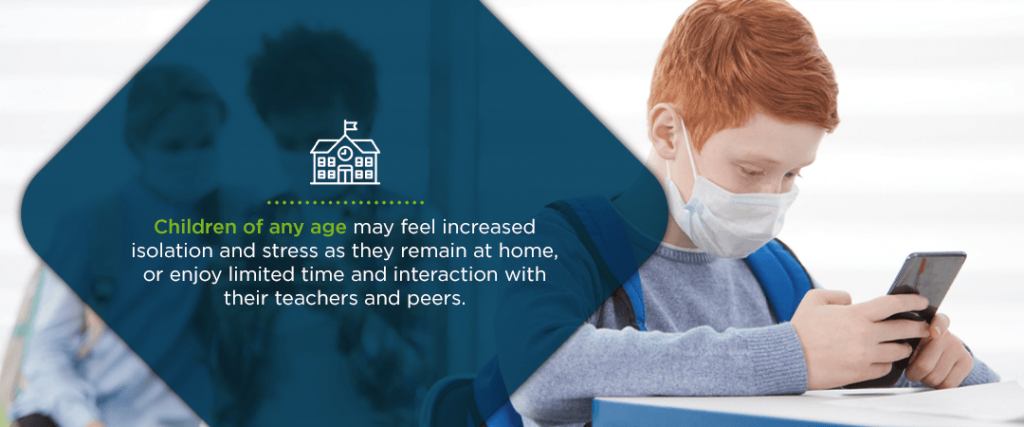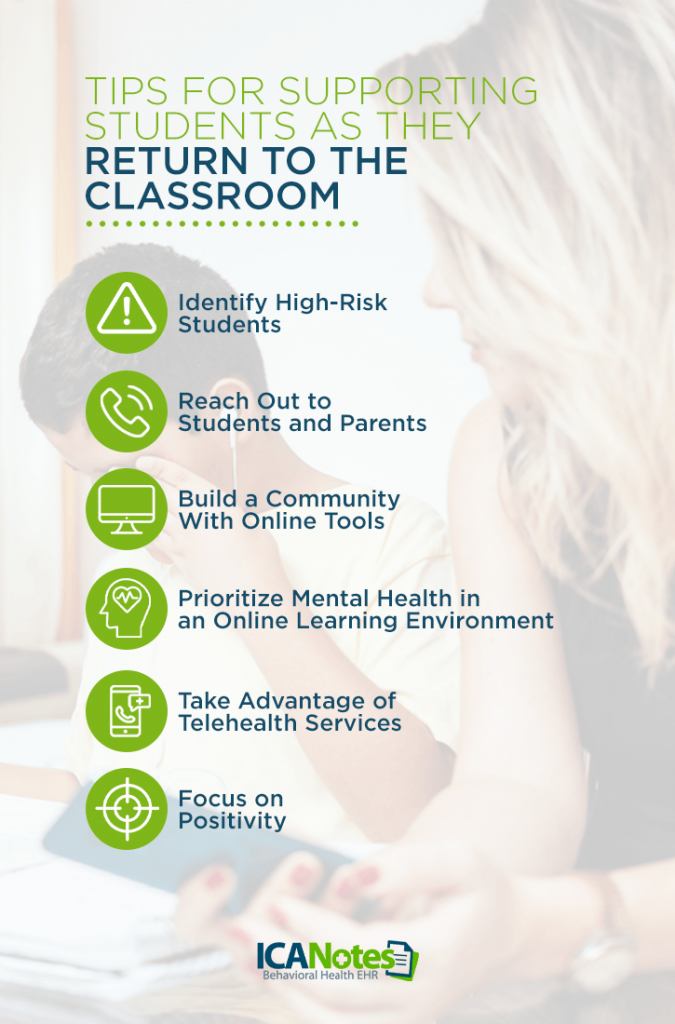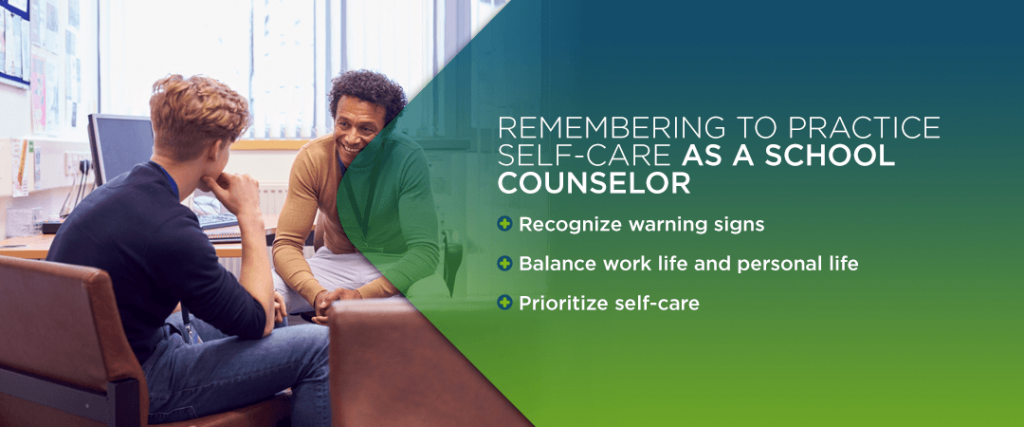Tips for Counselors as Students Return to the Classroom This Fall
Addressing mental health in schools has always been a crucial role for counselors, but in the wake of COVID-19, this task is more critical now than ever. The uncertainty about the pandemic has many of us wondering about the future of education and how students, parents, teachers and counselors will cope when in-person classes reopen.
New fears and stressors surround reopening plans for schools this fall. As a school counselor, you may want to check in with students and prioritize mental health and well-being during COVID-19. To help you navigate school counseling during the pandemic, we have developed this list of tips for supporting students as they return to the classroom.
Table of Contents
- Returning to the Classroom Amid COVID-19 and Student Mental Health
- Tips for Supporting Students as They Return to the Classroom
- Remembering to Practice Self-Care as a School Counselor
Returning to the Classroom Amid COVID-19 and Student Mental Health
What are the effects of returning to the classroom during COVID-19? What does this mean for students’ mental health? Going back to the physical classroom during the pandemic could jeopardize the health of children and their families. Children of any age may feel increased isolation and stress as they remain at home, or enjoy limited time and interaction with their teachers and peers.
As a counselor, you may notice that many students experience the following pandemic-related difficulties.
Feelings of Isolation
People are social creatures, and months of sheltering in place can lead to feelings of isolation, especially for children who don’t have siblings or neighbors their age to socialize with. Even when children can socialize with friends, needing to stay six feet apart and not being able to hug their friends can still contribute to feelings of isolation. As a counselor, you may want to help students remain positive and feel connected through games and activities.
Loss of Support From Clubs and Extracurriculars
COVID-19 has forced many clubs and extracurricular activities to get canceled or curtailed. For children who rely on the support and fun these activities provide, this can be a significant loss that leads to a decline in their mental health. They may no longer have a place to go besides school and home or hobbies to keep them occupied.
Economic Strain on Families
With so many Americans facing job loss because of the COVID-19 pandemic, many families are experiencing economic strain. Despite parents’ best efforts to keep these issues quiet and not worry their children, most kids are often more observant than parents realize and feel the tension of a financially difficult situation. Home and food insecurity can be incredibly stressful for children and can lead to mental health struggles.
These issues can decrease students’ mental well-being. As such, it is vital for school counselors to aid students in these situations, even if they are no longer meeting face-to-face in school due to COVID-19.
Tips for Supporting Students as They Return to the Classroom
Use the following school counselor tips for COVID-19 to support students as they return to the classroom, both online and in person.
1. Identify High-Risk Students
Identifying high-risk students is crucial, as not every student who needs help will be confident or comfortable with reaching out for assistance. As a counselor, you should know what to look for when determining what students are high-risk.
Teenagers may be the highest-risk group of students, as the changes brought by COVID-19 have significantly impacted their lives. Teens value their peer relationships and budding independence, along with many traditional milestones, like attending prom and graduation and getting their driver’s license. However, due to COVID-19, they might have missed many of these landmark occasions, and their future in postsecondary education may be uncertain.
Historically vulnerable populations may also become more fragile as a result of the pandemic. Due to school closures, students who typically receive additional services and support at school will no longer have access to these resources. Keep in mind these disruptions and the potential impact they can have on students.
2. Reach Out to Students and Parents
Counselors who interact with students in person can frequently pick up on body language and nonverbal cues that indicate when something is troubling the student. Interactions that solely take place online have limited this option.
Though you are likely already juggling many demands and your family, you may want to reach out to students and parents to check on them and offer support. Even a few minutes of conversation can mean a lot to a family and make a huge difference.
3. Build a Community With Online Tools
Online tools allow students to share videos and photos with classmates they can watch and comment on when they have time. As a counselor, you can use these same tools and online learning forums to interact with students and build a community. Through these tools, students can share their high and low points with you and describe how they are feeling daily.
Students’ answers to the questions you pose can help you determine who may be high-risk and in need of support. You may also choose to send a Google form to a handful of students each week, so you can prevent becoming overwhelmed with responses.
You can use free applications to facilitate group sessions, giving students a greater sense of community and support. Following their regular sessions, students can continue to access this group in a private setting and receive support while adhering to social distancing guidelines. If you are changing a group format, update the consent forms to reflect this.
Now more than ever, students need community and connection. Building a community with online tools can create a supportive and encouraging space for your students.
4. Prioritize Mental Health in an Online Learning Environment
As more schools move toward entirely virtual learning and others take a hybrid approach, counselors should prioritize mental health in this new online learning environment. Ensuring children can find stability and feel like everything will be OK should be one of your top priorities.
Additionally, when children are feeling happy and comfortable, they will be receptive to learning. Prioritizing a student’s mental health will ensure their well-being and success in this new learning environment.
5. Take Advantage of Telehealth Services
At ICANotes, we offer secure, HIPAA-compliant telehealth services that allow therapists to provide behavioral health services to their clients remotely. Using this feature, you can safely conduct your sessions from a distance to avoid exposing anyone to illness.
Currently, ICANotes works on both Mac and PC platforms. Your clients will be able to participate in sessions from their laptop, tablet or mobile phone. So how does this program work? To host a session with a client, you’ll follow the steps below:
- First, open ICANotes Telehealth.
- Next, you can initiate a session by clicking a button on your client’s chart or on the appointment.
- Finally, you can choose whether to send your client an email or a text message with a link to join the session.
Our available features include a virtual waiting room, interoffice chat and screen sharing. If you have a second monitor, you can also choose to drag the video session to this monitor and simultaneously document your session. To use ICANotes Telehealth, you and your client will need a computer, tablet or phone that has the following:
- Speaker
- Camera
- Microphone
Fortunately, many devices already have these features built in. However, if you want to improve your video or audio quality, you may want to consider investing in a better camera, headphones or an external microphone. Telehealth offers various benefits for you and your clients.
- Convenience: Telehealth sessions are more convenient than in-person sessions, as they can occur anywhere with a secure internet connection.
- Flexible schedule: Telehealth is a flexible format for behavioral health appointments, which allows you to enjoy more flexibility through increased and adaptable hours. Your clients will also be able to work sessions into their regular schedules.
- Improved access to care: If a client has medical issues or lacks reliable transportation, they can still get care from home through telehealth services. During the COVID-19 pandemic, remote access to care is crucial to stay safe and healthy.
- Increased income: Telehealth also allows you to increase your income, as you can work additional hours outside traditional times and serve more clients who would’ve otherwise been unable to attend sessions due to barriers. You’ll also have fewer no-shows.
For just $10 per user, you can add behavioral health telehealth to your ICANotes plan.
6. Focus on Positivity
Students who are worrying about external problems, like the COVID-19 pandemic, may have difficulty concentrating during virtual classes and while working on homework. As a school counselor, you can help students focus on positivity by engaging them in games and tasks. Through these activities, students will have control over an aspect of their daily lives, which will likely help them remain positive.
Daily affirmations can help students start the day with positive thoughts. Along with the pandemic, students today experience an onslaught of negativity through social media. Some positive affirmations in the morning and throughout the day can help reduce feelings of anxiety.
You may also want to encourage your students to start mindfulness journals to focus on writing about the positive aspects of their lives. They can also read these entries when they’re feeling down and reflect on what brings them joy and lifts their spirits.
Remembering to Practice Self-Care as a School Counselor
You’ve probably heard some adages about self-care – you can’t pour from an empty glass. On an airplane, you need to put on your oxygen mask before helping someone else with theirs. The gist of both ideas is that you cannot provide for others unless you are also taking care of yourself. This principle applies directly to counselors.
As a school counselor, if you neglect your mental and physical health, you’ll eventually stunt your ability to help others. If you expend all your energy on your clients and don’t replenish it through self-care, you won’t be effective in your role. You’ll also likely experience burnout and some mental health struggles yourself.
Despite many counselors being aware of the importance of self-care and encouraging their clients to take care of themselves, some counselors don’t practice self-care in their lives. For many, self-care isn’t second nature, and they need to consciously include it in their schedule. If you are a school counselor, follow these tips for practicing self-care.
- Recognize warning signs: Watch for a pattern of issues that signal you are on the verge of burnout. Warning signs may include a low energy level, problems at home, losing your sense of humor and feeling irritated, especially with your clients. Take physical and mental signs of stress seriously — they indicate you need to devote some time to self-care.
- Balance work life and personal life: Since many people now work at home due to COVID-19, it can be more challenging now than ever to achieve a work-life balance. Even if your school has reopened, you may still be taking your work home with you. Develop a routine when you go home at the end of the day or turn the computer off to signify that work is over and now is the time for your family and yourself.
- Prioritize self-care: For many counselors, making time for self-care isn’t an ingrained habit. Counselors’ natural inclination is to care for others, and as a result, may neglect to care for themselves. Because of COVID-19, you may feel like you don’t have the time between work and your family to dedicate time to self-care. However, you should carve out space in your schedule to take care of yourself, whether this takes the form of journaling, taking a walk or soaking in the tub.
Contact ICANotes for a Free Trial
At ICANotes, we offer the premier behavioral health EHR. We work with clients of all clinical disciplines in inpatient and outpatient settings, and we deliver the most intuitive and clinically robust charting solution for each specialty.
ICANotes is ready right from the box and will ensure your behavioral health documentation is comprehensive, sophisticated and nimble enough to meet the necessary standards. Our EHR is highly intuitive, so it requires little training. Contact us at ICANotes or request your free trial of telehealth for supporting students with mental health issues while socially distanced today.
Related Posts:
Supporting Emotional Wellbeing During the Coronavirus Pandemic
Self Care for Behavioral Health Professionals
Tips for Having a Successful Teletherapy Appointment
How to Increase Client Communication





